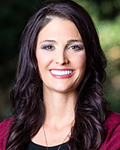



"My mission is to empower people of all ages, races, and body sizes to embrace the body they have been given and learn to love themselves so they can live their dreams."
-Sarah Maria
"Working with Sarah Maria has helped me to see that I am inherently loveable, beautiful, and valuable, no matter what. She has given me tools and techniques to break free from self-hatred and put love in its place. I am incredibly grateful for her and her incredible program. I recommend this book for anyone who wants to love her body and lover her life."
-Gabrielle Forleo, age twenty-six
Program Consultant,
Chopra Center for Wellbeing
"Sarah Maria's teachings are an amazing gift. It's an outstanding program that has changed my life! I highly recommend Sarah Maria's program to anyone who wants to experience living their most successful, beautiful life."
-Mary Schmidt, age forty-five
"Sarah Maria has shared many tools with me. But much more important to me, and what has been most meaningful, has been her quality of compassion. It is a gift and is like a gentle, deep awakening. Sarah Maria is a remarkable individual who works with the physical, mental, emotional, and spiritual person. I cannot thank her in a way that seems adequate"
-Leigh Ann Jones, age fifty-four

| HOME | BODY IMAGE & YOU | EATING DISORDERS | PRODUCTS & SERVICES | PRESSROOM | ABOUT US | CONTACT |
Anorexia Nervosa
Anorexia Nervosa, or commonly just called anorexia, is a psychiatric and eating disorder that is marked by the obsessive compulsion to be thin, even to the point of self-starvation.
The standard criteria for diagnosing anorexia are:
- Refusal to maintain a healthy body weight for their age and height, usually less than 85% of their ideal body weight
- An intense fear of becoming fat or gaining weight
- Disturbed views their body to the point of denial as to how thin they actually are
- Amenorrhea for three menstrual cycles, which the absence of the menstruation in reproductive women
Anorexia is often approached in a two ways. First is the extreme limiting of food intake and second is a binge/purge behavior or excessive exercising. Anorexia is a complex disorder, which manifests itself physically, psychologically and socially. Besides the physical aspects, other sub-factors may include extreme perfectionism, over-dependency, isolation, lack of sexual activity, obsessive-compulsive behaviors and mood disorders.
Women make up 95% of anorexia cases but there are an increasing number of men who are also being diagnosed. Anorexia usually develops in adolescence with the average age of onset being between 15-17 years old.
If left untreated, anorexia can have serious, life-threatening implications. Severe cases require hospitalization and on-going patient care but there are varying degrees of anorexia that can be addressed through other avenues. Regardless of the severity, overall treatment must focus on more than just weight gain. A team approach towards treatment addresses all aspects of the patient?s life.
- Medical Treatment/Nutritional Therapy-
Due to the starvation of the body of needed nutrients, doctors must work to treat any medical conditions that may occur due to anorexia. Areas that are assessed include bone loss, low potassium levels, hormone imbalance, heart condition, electrolyte imbalance and low blood pressure. Medication is sometimes suggested, including anti-depressants, anti-anxiety medications or atypical anti-psychotic drugs. In addition to physician care, someone suffering from anorexia needs to work closely with a nutritionist, to relearn information on a healthy diet, caloric intake, meal plans and weight goals.
- Psychotherapy-
Individual, family and group therapy can all help towards the recovery process. Individual therapy can focus on self-esteem issues, distorted thinking patterns and behavior, while family therapy addresses conflicts in the family and the family dynamic. Family therapy is especially important for those individuals still living at home with their families since anorexia has far reaching impact on all family members. Group therapy provides an open, confidential environment with other sufferers. This allows her to know that she is not alone.
- Day Treatment Programs-
Day treatment programs are intended for those people who are transitioning out of the hospital or who don?t need intensive inpatient anorexia treatment. Done on an outpatient basis, it?s designed to meet her specific needs and treatment goals.
- Alternative Therapies-
There are many alternative therapies that can help during the anorexia recovery process. Many of the following therapies can improve self-expression and body awareness: art therapy, music therapy, psychodrama, yoga, acupuncture, meditation and relaxation techniques. Especially helpful is yoga and meditation, which allows her to become more in tune with her body, as she learns to gain control in a positive manner.
- Meditation-
Meditation is an invaluable tool for helping restore balance and wholeness. Through the regular practice of meditation people come to realize that they are not their thoughts, but rather the thinker of their thoughts. They can begin to differentiate themselves from the voice of anorexia that keeps them trapped in an endless web of suffering.
Though anorexia has serious health implications when left untreated, it is encouraging to note that 50% of those who suffer from the disorder will recover without relapse or multiple treatments, if they receive appropriate treatment. There are a wide variety of treatment modalities that can aid in the success of recovery. Anorexia does not have to be a lifelong struggle. It can be overcome.
Resources
MedicineNet.com
http://www.medicinenet.com/anorexia_nervosa/article.htm
Emedicine.com
http://www.emedicine.com/emerg/topic34.htm
MayoClinic.com
http://www.mayoclinic.com/health/anorexia/DS00606/DSECTION=8
The National Association for Anorexia Nervosa and Associate Disorders
http://www.anad.org

